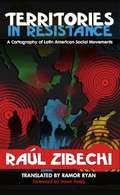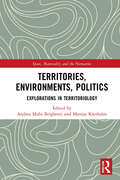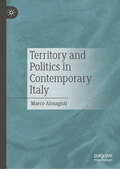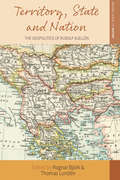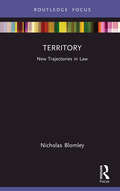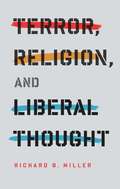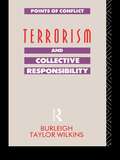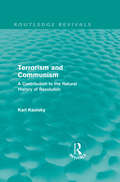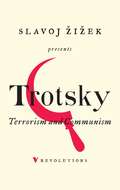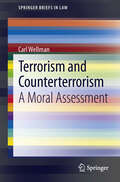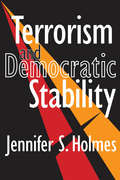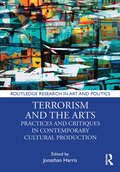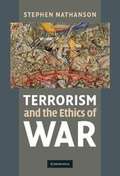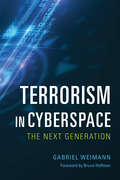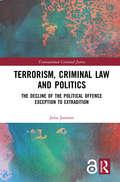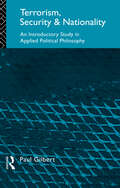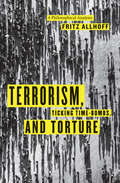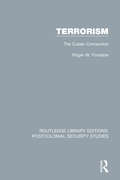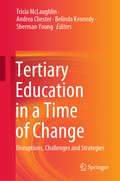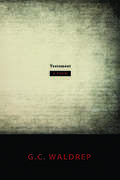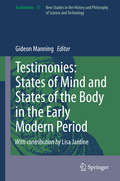- Table View
- List View
Territories in Resistance
by Raul Zibechi Ramor Ryan"Rich and complicated . . . [Territories in Resistance] will be a key reference point in the development of anti-systemic thought."--Gilberto López y Rivas, La Jornada Territories in Resistance is an indispensable complement to existing literature on Latin American autonomous social movements. Explore the "other worlds" being created in the wreckage of colonialism and capitalism. From Mexico, Ecuador, and Colombia to Argentina and Brazil, no living author digs as deep and presents theoretical challenges quite like Raúl Zibechi. Raúl Zibechi is an international analyst for Brecha, a weekly journal in Montevideo, Uruguay, and the author of Dispersing Power: Social Movements as Anti-State Forces (AK Press, 2010).
Territories, Environments, Politics: Explorations in Territoriology
by Andrea Mubi BrighentiThis collection seeks to illustrate the state of the art in territoriological research, both empirical and theoretical. The volume gathers together a series of original, previously unpublished essays exploring the newly emerging territorial formations in culture, politics and society. While the globalisation debate of the 1990s largely pivoted around a ‘general deterritorialisation’ hypothesis, since the 2000s it has become apparent that, rather than effacing territories, global connections are added to them, and represent a further factor in the increase of territorial complexity. Key questions follow, such as: How can we further the knowledge around territorial complexities and the ways in which different processes of territorialisation co-exist and interact, integrating scientific advances from a plurality of disciplines? Where and what forms does territorial complexity assume, and how do complex territories operate in specific instances? Which technological, political and cultural facets of territories should be tackled to make sense of the life of territories? How and by what different or combined methods can we describe territories, and do justice to their articulations and meanings? How can the territoriological vocabulary relate to contemporary social theory advancements such as ANT, the ontological turn, the mobilities paradigm, sensory urbanism, and atmospheres research? How can territorial phenomena be studied across disciplinary boundaries? Territories, Environments, Politics casts a fresh perspective onto a number of key contemporary socio-spatial phenomena. Refraining from the attempt to ossify territoriology into some disciplinary straightjacket, the collection aims to illustrate the scope of current territoriological research, its domain, its promises, its theoretical advancements, and its methodological reflection in the making. Scholars interested in social research will find in this collection a rich and imaginative theoretical-methodological toolkit. Students in human geography, anthropology and sociology, socio-legal studies, architecture and urban planning will find Territories, Environments, Politics of interest.
Territory and Politics in Contemporary Italy
by Marco AlmagistiThe book is structured around a coherent central theme: the cultural and social basis of democracy in the Italian experience. In particular, it discusses the Italian political system, since Italy is the only country to have experienced the entire party system collapse and facing a crisis that seems endless. This work examines Italian democracy focusing on its territorial dynamics throughout the last two centuries. From the particular context of Italian democracy, the author explores the new cleavage that advances in all consolidated democracies and identifies the reasons for its present crisis and possible ways out.
Territory, State and Nation: The Geopolitics of Rudolf Kjellén (Making Sense of History #41)
by Ragnar Björk Thomas LundénRudolf Kjellén, regularly referred to as “the father of geopolitics,” developed in the first decade of the twentieth century an analytical model for calculating the capabilities of great-power states and promoting their interests in the international arena. It was an ambitious intellectual project that sought to bring politics into the sphere of social science. Bringing together experts on Kjellén from across the disciplines, Territory, State and Nation explores the century-long international impact, analytical model, and historical theories of a figure immensely influential in his time who is curiously little-known today.
Territory: New Trajectories in Law (New Trajectories in Law)
by Nicholas BlomleyThis book introduces readers to the concept of territory as it applies to law while demonstrating the particular work that territory does in organizing property relations. Territories can be found in all societies and at all scales, although they take different forms. The concern here is on the use of territories in organizing legal relations. Law, as a form of power, often works through a variety of territorial strategies, serving multiple legal functions, such as attempts at creating forms of desired behaviour. Landed property, in Western society, is often highly territorial, reliant on sharply policed borders and spatial exclusion. But rather than thinking of territory as obvious and given or as a natural phenomenon, this book focuses particularly on its relation to property to argue that territory is both a social product, and a specific technology that organizes social relations. That is: territory is not simply an outcome of property relations but a strategic means by which such relations are communicated, imagined, legitimized, enforced, naturalized and contested. Accessible to students, this book will be of interest to those working in the areas of sociolegal studies, geography, urban studies, and politics.
Terror, Religion, and Liberal Thought (Columbia Series on Religion and Politics)
by Richard MillerReligious violence may trigger feelings of repulsion and indignation, especially in a society that encourages toleration and respect, but rejection contradicts the principles of inclusion that define a democracy and its core moral values. How can we think ethically about religious violence and terrorism, especially in the wake of such atrocities as 9/11?Known for his skillful interrogation of ethical issues as they pertain to religion, politics, and culture, Richard B. Miller returns to the basic tenets of liberalism to divine an ethical response to religious extremism. He questions how we should think about the claims and aspirations of political religions, especially when they conflict so deeply with liberal norms and practices, and he suggests how liberal critics can speak confidently in ways that respect cultural and religious difference.Miller explores other concerns within these investigations as well, such as the protection of human rights and a liberal democratic commitment to multicultural politics. In relating religion and ethics, he develops a new lens for viewing political religions and their moral responsibilities. This probing inquiry also forces us to rethink our response to 9/11.
Terrorism and Collective Responsibility (Points of Conflict)
by Burleigh Taylor WilkinsThe terrorist threat remains a disturbing issue for the early 1990s. This book explores whether terrorism can ever be morally justifiable and if so under what circumstances.Professor Burleigh Taylor Wilkins suggests that the popular characterisation of terrorists as criminals fails to acknowledge the reasons why terrorists resort to violence. It is argued that terrorism cannot be adequately understood unless the collective responsibility of organised groups, such as political states, for wrongs allegedly done against the groups which the terrorists represent is taken into account. Terrorism and Collective Responsibility provides an analysis of various models of collective responsibility, and it takes into account recent discussions of military responsibility and business ethics. The book also explores the problems that terrorism poses for the just war tradition.The arguments of prominent philosophers against terrorism are critically examined and the claim that terrorism necessarily violates the rights of innocent persons is considered. Wilkins sets forth an original definition of terrorism that is sure to provoke controversy.
Terrorism and Communism: A Contribution to the Natural History of Revolution (Routledge Revivals)
by Karl KautskyFirst published in English in 1920, this work is a reissue of Karl Kautsky's seminal work dealing with the origins and history of the forces at work in revolutionary epochs, which offers pathbreaking insights on the development of civilisation. The opening chapters, dealing with eigthteenth century France, are of special interest to the student of the French revolution. The section devoted to the Commune of Paris offers a stimulating and provocative description of this famous govenment of the working class. The reissue of this controversial and extraordinary work will be welcomed by all those interested in the history of Communism in particular and the theory and history of revolution in general.
Terrorism and Communism: A Reply to Karl Kautsky
by Leon TrotskyWritten in the white heat of revolutionary Russia’s Civil War, Trotsky’s Terrorism and Communism is one of the most potent defenses of revolutionary dictatorship. In his provocative commentary to this new edition the philosopher Slavoj i ek argues that Trotsky’s attack on the illusions of liberal democracy has a vital relevance today.
Terrorism and Counterterrorism
by Carl WellmanThis book presents a definition of terrorism that is broad and descriptive and much needed to prevent misunderstanding. The book identifies the features that make terrorism 'wrong', including coerciveness, the violation of rights and undermining of trust. Next, it evaluates reasons given for terrorism such as the protection of human rights and the liberation of oppressed groups as not normally justified. Following this, the book identifies and evaluates international responses to terrorism, taking into account General Assembly and Security Council resolutions, United Nations conventions and criminalization in international law. It also looks at national responses which often take the shape of surveillance, detention, interrogation, trials, targeted killings, intrusion and invasion. Finally, the book discusses how, if at all, the moral norms of personal morality apply to the actions of nation states.
Terrorism and Democratic Stability (Perspectives On Democratization Ser.)
by Jennifer S. HolmesCan terrorism and state violence cause democratic breakdowns? Although the origins of violence have been studied, only rarely are its consequences. And even when the consequences of violence are studied, its effects are usually limited to consideration of preexisting conflict that originally spawned the violence. In Terrorism and Democratic Stability, Holmes claims that to understand the consequences of violence on democratic stability, terrorism and state responses to terrorism must be studied together. Her innovative approach identifies citizen support as a key factor in the state's ability to sustain democracy and achieve stability. Her focus is Uruguay, Peru, and Spain.
Terrorism and Transatlantic Relations: Threats and Challenges (Security, Conflict and Cooperation in the Contemporary World)
by Klaus Larres Tobias HofThis book explores the development of transatlantic policy on international terrorism and assesses the situation today. It takes an interdisciplinary approach to terrorism and transatlantic relations, bringing together experts from contemporary history, political science, military strategy, psychology, law and security. Looking back to the roots of modern terrorism, from the late 70s to 9/11 and beyond, the volume evaluates how attitudes and approaches have changed over this period. It analyses potential solutions for finding a shared philosophy to counter the threat of transnational terrorism in the US and Europe, against a rapidly changing political landscape. Chapters cover a range of topics, including the psychology of terrorism, online propaganda, domestic terrorism, terrorism and finance and cyber security.
Terrorism and the Arts: Practices and Critiques in Contemporary Cultural Production (Routledge Research in Art and Politics)
by Jonathan HarrisThis book assesses the key definitions, forms, contexts and impacts of terrorist activity on the arts in the modern era, using historical and contemporary perspectives. Its empirical case studies include theatre, literature, music, visual art, mass media, film and the mores of ‘ordinary life.’ While its immediate reflective context is Islamic fundamentalist terrorism, the book reviews a broader range of definitions and counter-definitions of 'terrorism', 'state terrorism' and 'states of terror,' examining uses of the terms through a series of comparative analyses. Chapters focus on the intersection of these definitional questions with heuristic analysis of art forms, cultural activities and their socio-historical contexts. This book will be of interest to scholars in art history, terrorism, politics and the media, and visual culture.
Terrorism and the Ethics of War
by Stephen NathansonMost people strongly condemn terrorism; yet they often fail to say how terrorist acts differ from other acts of violence such as the killing of civilians in war. Stephen Nathanson argues that we cannot have morally credible views about terrorism if we focus on terrorism alone and neglect broader issues about the ethics of war. His book challenges influential views on the ethics of war, including the realist view that morality does not apply to war, and Michael Walzer's defence of attacks on civilians in 'supreme emergency' circumstances. It provides a clear definition of terrorism, an analysis of what makes terrorism morally wrong, and a rule-utilitarian defence of noncombatant immunity, as well as discussions of the Allied bombings of cities in World War II, collateral damage, and the clash between rights theories and utilitarianism. It will interest a wide range of readers in philosophy, political theory, international relations, and law.
Terrorism and the Right to Resist
by Christopher J. FinlayThe words 'rebellion' and 'revolution' have gained renewed prominence in the vocabulary of world politics and so has the question of justifiable armed 'resistance'. In this book Christopher J. Finlay extends just war theory to provide a rigorous and systematic account of the right to resist oppression and of the forms of armed force it can justify. He specifies the circumstances in which rebels have the right to claim recognition as legitimate actors in revolutionary wars against domestic tyranny and injustice and wars of liberation against wrongful foreign occupation and colonialism. Arguing that violence is permissible only in a narrow range of cases, Finlay shows that the rules of engagement vary during and between different conflicts and explores the potential for irregular tactics to become justifiable, such as non-uniformed guerrillas and civilian disguise, the assassination of political leaders and regime officials, and the waging of terrorist war against civilian targets.
Terrorism in Contemporary France: A Vicious Circle of Violence (Contributions to Political Science)
by Jan EichlerThis book examines radical Jihad terrorism in contemporary France and sheds light on the vicious circle of violence, based on reciprocity. Building upon the theoretical heritage of Pierre Bourdieu, the book develops a methodology and a concept of the vicious circle of violence in France, based on three pillars: actors, dynamics, and effects. Discussing the development of global terrorism between the 9/11 attacks and the launch of the European front against global terror in Spain and Great Britain, the book goes on to analyze why France has not been attacked during the 2000s and why it, in turn, became a primary target of terrorist attacks during the 2010s, with a special emphasis on communication theory and the concept of reciprocity. Studying these attacks on the international level, the book offers insights into violent acts of revenge of the radical home-grown jihadists for the French military interventions in four Middle Eastern and North African (MENA) countries, especially Libya and Syria. It further investigates the following growing radicalization of the Muslim community on the national level as a reason for terrorist attacks. Finally, the book sheds light on the reactions from within the French military to these developments, before closing with a presentation of the new political context after the 2022 presidential and legislative elections. Based on empirical evidence and a theoretical background this book will appeal to students and scholars of political science and international relations, as well as policy-makers and practitioners interested in a better understanding of terrorism, French politics, and communication theory.
Terrorism in Cyberspace: The Next Generation
by Gabriel WeimannThe war on terrorism has not been won, Gabriel Weimann argues in Terrorism in Cyberspace, the successor to his seminal Terror on the Internet. Even though al-Qaeda's leadership has been largely destroyed and its organization disrupted, terrorist attacks take 12,000 lives annually worldwide, and jihadist terrorist ideology continues to spread. How? Largely by going online and adopting a new method of organization. Terrorist structures, traditionally consisting of loose-net cells, divisions, and subgroups, are ideally suited for flourishing on the Internet through websites, e-mail, chat rooms, e-groups, forums, virtual message boards, YouTube, Google Earth, and other outlets. Terrorist websites, including social media platforms, now number close to 10,000. This book addresses three major questions: why and how terrorism went online; what recent trends can be discerned—such as engaging children and women, promoting lone wolf attacks, and using social media; and what future threats can be expected, along with how they can be reduced or countered. To answer these questions, Terrorism in Cyberspace analyzes content from more than 9,800 terrorist websites, and Weimann, who has been studying terrorism online since 1998, selects the most important kinds of web activity, describes their background and history, and surveys their content in terms of kind and intensity, the groups and prominent individuals involved, and effects. He highlights cyberterrorism against financial, governmental, and engineering infrastructure; efforts to monitor, manipulate, and disrupt terrorists' online efforts; and threats to civil liberties posed by ill-directed efforts to suppress terrorists' online activities as future, worrisome trends.
Terrorism on Trial: Political Violence and Abolitionist Futures
by Nicole NguyenA landmark sociological examination of terrorism prosecution in United States courts Rather than functioning as a final arbiter of justice, U.S. domestic courts are increasingly seen as counterterrorism tools that can incapacitate terrorists, maintain national security operations domestically, and produce certain narratives of conflict. Terrorism on Trial examines the contemporary role that these courts play in the global war on terror and their use as a weapon of war: hunting, criminalizing, and punishing entire communities in the name of national security. Nicole Nguyen advocates for a rethinking of popular understandings of political violence and its root causes, encouraging readers to consider anti-imperial abolitionist alternatives to the criminalization, prosecution, and incarceration of individuals marked as real or perceived terrorists. She exposes how dominant academic discourses, geographical imaginations, and social processes have shaped terrorism prosecutions, as well as how our fundamental misunderstanding of terrorism has led to punitive responses that do little to address the true sources of violence, such as military interventions, colonial occupations, and tyrannical regimes. Nguyen also explores how these criminal proceedings bear on the lives of defendants and families, seeking to understand how legal processes unevenly criminalize and disempower communities of color. A retheorization of terrorism as political violence, Terrorism on Trial invites readers to carefully consider the role of power and politics in the making of armed resistance, addressing the root causes of political violence, with a goal of building toward a less violent and more liberatory world.
Terrorism, Criminal Law and Politics: The Decline of the Political Offence Exception to Extradition (Transnational Criminal Justice)
by Julia JanssonRecent atrocities have ensured that terrorism and how to deal with terrorists legally and politically has been the subject of much discussion and debate on the international stage. This book presents a study of changes in the legal treatment of those perpetrating crimes of a political character over several decades. It most centrally deals with the political offence exception and how it has changed. The book looks at this change from an international perspective with a particular focus on the United States. Interdisciplinary in approach, it examines the fields of terrorism and political crime from legal, political science and criminological perspectives. It will be of interest to a broad range of academics and researchers, as well as to policymakers involved in creating new anti-terrorist policies.
Terrorism, Security and Nationality: An Introductory Study in Applied Political Philosophy
by Paul GilbertTerrorism, Security and Nationality shows how the ideas and techniques of political philosophy can be applied to the practical problems of terrorism, State violence and national identity. In doing so it clarifies a wide range of issues in applied political philosophy including ethics of war; theories of state and nation; the relationship between communities and nationalisms; human rightss and national security.Paul Gilbert identifies conflicting conceptiona of civil strife by different political communities and investigates notions of terrorism both as unjust war and as political crime. He concludes by considering the proper response of the State to political violence.
Terrorism, Ticking Time-Bombs, and Torture: A Philosophical Analysis
by Fritz AllhoffA provocative philosophical investigation into the ethics of torture, The War on Terror, and making tough choices in exceptional circumstances. The general consensus among philosophers is that the use of torture is never justified. In Terrorism, Ticking Time-Bombs, and Torture, Fritz Allhoff demonstrates the weakness of the case against torture; while allowing that torture constitutes a moral wrong, he nevertheless argues that, in exceptional cases, it represents the lesser of two evils. Allhoff does not take this position lightly. He begins by examining the way terrorism challenges traditional norms, discussing the morality of various practices of torture, and critically exploring the infamous ticking time-bomb scenario. After carefully considering these issues from a purely philosophical perspective, he turns to the empirical ramifications of his arguments, addressing criticisms of torture and analyzing the impact its adoption could have on democracy, institutional structures, and foreign policy. The crucial questions of how to justly authorize torture and how to set limits on its use make up the final section of this timely, provocative, and carefully argued book.
Terrorism: The Cuban Connection
by Roger W. FontaineFirst published in 1988, Terrorism: The Cuban Connection examines Cuba’s involvement in terrorism. With a focus on Havana, the book begins by looking at Cuba’s history and the origins of terrorism. As it progresses, the book traces the development of terrorism and explores Cuba’s connections with other parts of the world, including America, Russia, the Caribbean, South America, the Middle East, and Sub-Saharan Africa. Terrorism: The Cuban Connection is a detailed study, equipped with a wealth of key documents and photographs.
Tertiary Education in a Time of Change: Disruptions, Challenges and Strategies
by Sherman Young Tricia McLaughlin Andrea Chester Belinda KennedyThis book shares exemplary teaching and learning practices from the tertiary sector, and addresses important issues concerning quality, scholarship and innovation in teaching and learning in tertiary settings. It takes on classic issues regarding curricula, technologies and assessment, but approaches them from novel perspectives and using a variety of methodological approaches. Its chapters explore innovative and cutting-edge ideas in tertiary education. Readers will be both challenged and inspired to investigate the ideas discussed further.
Testament
by G.C. WaldrepIn this book-length poem, G.C. Waldrep addresses matters as diverse as Mormonism, cymatics, race, Dolly the cloned sheep, and his own life and faith. Drafted over twelve trance-like days while in residence at Hawthornden Castle, Waldrep responds to such poets as Alice Notley, Lisa Robertson, and Carla Harryman, and tackles the question of whether gender can be a lyric form.G.C. Waldrep's books include Disclamor (BOA Editions Ltd., 2007) and Your Father on the Train of Ghosts (BOA Editions, Ltd., 2011). He lives in Lewisburg, Pennsylvania, where he teaches at Bucknell University, edits West Branch, and serves as editor-at-large for the Kenyon Review.
Testimonies: States of Mind and States of the Body in the Early Modern Period (Archimedes #57)
by Gideon ManningThis book reconnects health and thought, as the two were treated together in the seventeenth century, and by reuniting them, it adds a significant dimension to our historical understanding. Indeed, there is hardly a single early modern figure who took a serious interest in one but not the other, with their attitudes toward body-mind interaction often revealed in acts of self-diagnosis and experimentation. The essays collected here specifically reveal the way experiment and especially self-experiment, combined with careful attention to the states of mind which accompany states of body, provide a new means of assessing attitudes to body-mind interactions just as they show the abiding interest and relevance of source material typically ignored by historians of science and historians of philosophy. In the surviving records of such experimenting on one’s own body, we can observe leading figures like Francis Bacon, Robert Boyle and Robert Hooke, deliberately setting out to repeat pleasurable, or intellectually productive moods and states of mind, by applying the same medicine on successive occasions. In this way we can witness theories of the working of the human mind being developed by key members of an urban culture (London; interregnum Oxford) who based those theories in part on their own regular, long-term use of self-administered, mind-altering substances. It is hardly an overstatement to claim that there was a significant drug culture in the early modern period linked to self-experimentation, new medicines, and the new science. This is one of the many things this volume has to teach us.
